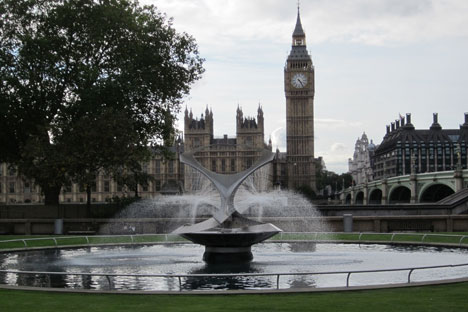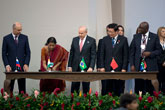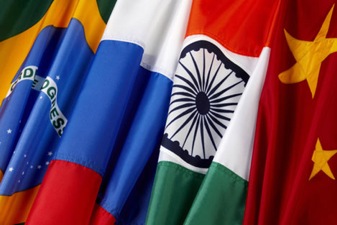Why the Anglosphere needs to be stopped

The Anglopshere can only beat small nations to pulp so a militarised BRICS will be more than enough to stop them. Source: Phoebe Taplin
The US, Britain, Canada, Australia and New Zealand are the five countries of the Anglosphere. Post World War II they are so closely allied and their intelligence networks so well integrated that you could say the Anglosphere is a single country spread across five separate territories.
It is well known that their militaries are well synced but did you know that all three US Army Corps have Canadian deputy commanders? Or that citizens of Anglo nations serve as important exchange or liaison officers with top US commands?
CIA whistleblower Edward Snowden has revealed the nature and extent of teamwork among the Anglosphere members. The Five Eyes spying network – which scoops up phone, fax and email data from across the world – has undoubtedly led to commercial, diplomatic and political benefits for all five Anglosphere members.
New world order
However, the Anglosphere isn’t what it used to be. After the triumphant post-Soviet phase, in recent years there has been a sense of economic and military decline in all the five English speaking countries. The dramatic impact of the BRICS’ growing clout has also unnerved them.
There is a palpable sense of fear in the Anglosphere countries that with their dominance gone, they cannot write the rules any more. In America Alone: The End Of The World As We Know It, Canadian author Mark Steyn sees the US and England “facing nothing so amiable and genteel as continental-style ‘decline’ but something more like sliding off a cliff”.
On the other side of the world, The Australian newspaper laments that Canberra has become Asia’s mine, dependent on supplying commodity exports to emerging economies such as China: “We are to be attendants to an emerging empire: providers of food, energy, resources, commodities and suppliers of services such as education, tourism, gambling/gaming, health (perhaps), and lifestyle property.”
Perhaps the tipping point – when the Anglosphere’s fear turned into panic – was Russia’s aggressive diplomacy that blocked the US from bombing Syria. This is hardly a small matter. The English speaking world was baying for President Bashar al-Assad’s blood. “Hit him hard” The Economist, the British mouthpiece, headlined.
But the Russian block – with BRICS backing – stymied those plans. The Anglosphere realised the world had changed considerably since 2003, when Saddam Hussein was overthrown, with few countries daring to protest the illegal act.
Crimea and Ukraine are two other instances where the Anglosphere finds itself isolated.
With their dominant status now a thing of the past, the Anglosphere countries are panicking at the prospect of international isolation and irrelevance. This is making them close ranks. In this backdrop, the five countries of British origin have been making a number of moves towards integration.
August 19, 2014. Following days of racial riots in the American city of Ferguson, Missouri, the state’s Lt. Governor Peter Kinder lashed out at the rioters for seeking justice in the streets, and bizarrely demanded “Anglo American” justice. “One of the great advances of Anglo-American civilisation is we do not have politicised trials,” he declared.
May 20, 2014. The UK government announced that the US, UK, Australia and Canada are establishing combined space operations among their armed forces. “Australia, Canada, the United Kingdom, and the United States have furthered their defence cooperation by establishing a partnership on combined space operations," it said.
January 14, 2014. Canada’s defence department announced the formal signing of a long-term partnership with the US Department of Defence. Among other things “this partnership permits the Canadian Space Operations Centre to coordinate and share unclassified information and data in support of government agencies”.
November 21, 2013. The US Air Force Space Command announced it would relocate a tracking radar from Antigua to Australia. It would also deploy a new DARPA-developed optical telescope there. The telescope is especially useful for monitoring geosynchronous orbit where major spy satellites are located.
September 24, 2012. Britain and Canada announced they will establish joint diplomatic missions and share embassy offices abroad. The proposals involve ‘co-locating’ embassies and sharing consular services in countries where one of the nations does not have an embassy. Australia and New Zealand already have such an arrangement in place.
Isolated, these developments may not be considered noteworthy. But they are part of a growing trend where the Anglosphere is closing ranks to form a more cohesive unit to increase their weight in global affairs. Considering the US economy is still a very large economy and its military power projection capability is unmatched, there is a good chance the group could bounce back.
The five Anglos have jointly fought together in almost all modern wars – in Korea, Vietnam, Iraq and Afghanistan. Their ability to stick together during conflicts is a key reason why group leader US is able to rush forces into conflict zones.
Checkmating the Anglo revival
The great rival of this war-obsessed group was the Russian-led Soviet Union, which is now history. That leaves the BRICS as the only group with the ability to take on the Anglosphere. For, as surely as day follows night, the Anglos will come swinging back.
So it is imperative that somebody be in a position to stop these countries from trampling on small countries and destabilising larger ones. The good news is Russia and China are strongly committed to the BRICS becoming a more political group. Brazil – ever since Snowden revealed the US was spying on Brazilian leader Dilma Rousseff – is now strongly opposed to the US.
The problem country seems to be India. Last week it signed a $2.5 billion helicopter deal with the US, which had last year publicly arrested an Indian woman diplomat and then conducted a shameful – and unnecessary – cavity search on her.
Despite its involvement in the BRICS, India is acting like a fence sitter. To be sure, India’s behaviour may be because of two centuries of brainwashing and Anglicising. Only a brainwashed person could have said what India’s Prime Minister Manmohan Singh said in 2005: “If there is one phenomenon on which the sun cannot set, it is the world of the English-speaking peoples, in which the people of Indian origin are the single largest component.”
Like Singh, there are plenty of Indians suffering from chronic Anglophilia, and are prone to make such shameful and factually wrong statements. The good news is they are growing old and will disappear soon. The bad news is the Anglosphere can dangle carrots – such as university education, jobs etc – before the young generation.
The best defence against the Anglosphere’s reemergence is for the BRICS to stick together. As they have shown in recent crises such as Crimea, Ukraine and Syria, this rainbow coalition can stop the lily-white Anglosphere. To be more effective, the BRICS must coalesce into a political union and join their military forces to form a rapid reaction force. The Anglosphere can only beat small nations to pulp so a militarised BRICS will be more than enough to stop them.
Such a policy needs to be implemented only up to 2050. By then the US is projected to be a Hispanic majority nation. With its leader gone, that should be the end of the Anglopshere.
All rights reserved by Rossiyskaya Gazeta.
Subscribe
to our newsletter!
Get the week's best stories straight to your inbox



